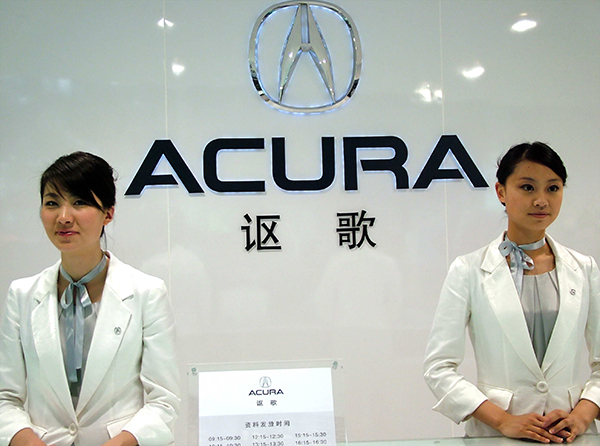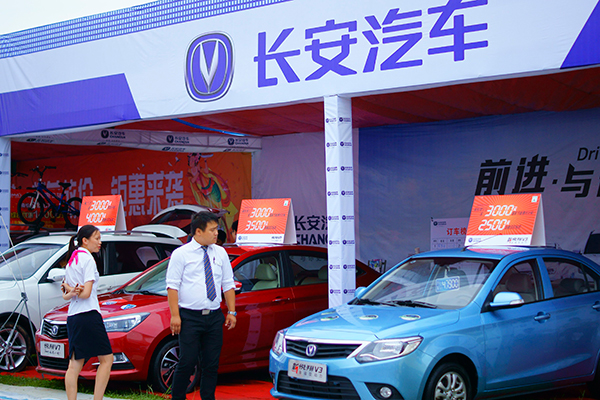 |
|
Two Acura hostesses stand at the Japanese brand's booth at the Shanghai auto show in 2007. Due to its obscurity, Acura is often confused with local Chinese brand Changan. [Photo/China Daily] |
Honda's premium arm Acura is betting big on its first China-made vehicle, but experts believe its principal role will be to promote public awareness of the brand.
On July 4, the first locally made CDX rolled off GAC Honda's assembly line in Guangzhou, and the joint venture said it plans to sell 10,000 units by the end of the year.
The joint venture said the entry-level SUV is designed for Chinese customers and will compete with the Audi Q3, Mercedes-Benz GLA and BMW X1 models.
One of its parent companies, GAC, is planning to invest 370 million yuan ($55.37 million) by the end of the year to upgrade the plant.
Industry insiders have called the sales plan over ambitious for a brand that sold fewer than 1,200 imported cars in the first half of this year, a nearly 70 percent nosedive compared to the same period last year.
The disappointing figures are mainly due to pricey, large-displacement imported models and the brand's obscurity.
Its entry-level model ILX is priced higher than comparable models from Lexus and Infiniti, which are both premium Japanese brands, and even some models from the dominant German auto giants.
Despite the fact that it has been in China for 10 years, the brand remains largely unknown, and is often mistaken for the local Chinese brand, Changan, because of their similar logos.
The reasons for its obscurity seem clear. Acura cars are seldom seen on either the roads or in any form of advertising, despite the fact that this year marks the 30th anniversary of the brand and the 10th anniversary of its entry into the Chinese market.
 |
|
Visitors check out a Changan car at an auto show in Yichang, Hubei province, in 2015. [Photo/China Daily] |
Auto analyst Zhong Shi said that although Honda would prefer to invest in improving its products rather than in forging emotional bonds with customers, there are problems with such an approach.
"There are too many cars in the market now and without publicity, a brand has little chance of gaining public recognition," Zhong said.
Infiniti offers the perfect example of how improved advertising can boost a brand.
It sponsored a reality TV show in late 2013, and the move boosted its brand awareness which had grown by 30 percent by the end of 2014, with its sales for the same year exceeding 30,000 units, a 76 percent surge year-on-year.
Acura is also hampered by a small sales network.
It has only 42 dealerships nationwide, with 11 in Guangdong province, where the joint venture is based, and the others spread sporadically around other regions.
Mercedes-Benz has about 500 dealerships in China, and Lexus has 156.
Last year, each Acura dealership on average sold less than 100 cars.
Zhong described the situation as a vicious cycle.
He said: "The poor sales figures lead to small profits, so it (Acura) holds no appeal for investors, and the small number of dealerships will, in turn, affect car sales."
The premium segment of the Chinese auto market is intensely competitive, but the overall pattern is well established.
The three German giants - Audi, BMW and Mercedes-Benz - are firmly in the top three positions, leaving others to compete for the remaining market share through product investment, more dealerships and increased publicity.
It appears that Acura has some way to go before it can be considered genuinely established in the market.
To an extent, Zheng Heng, GAC Honda's executive deputy general manager, was right: The model's localization heralds both a brand new start and a challenge.
